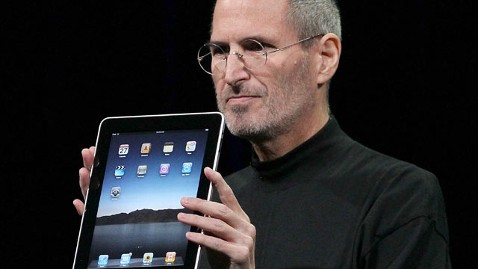Apple to Remake Textbooks; Project Begun by Steve Jobs

Steve Jobs introduces the iPad in San Francisco, Jan. 27, 2010. Justin Sullivan/Getty Images
Even in his last months, Steve Jobs, the Apple co-founder who had already masterminded the iPad and iPhone, reimagined digital music, animated films and done so much more in modern technology, said he had new projects on his mind.
On Thursday in New York, Apple is holding what it calls "an education announcement in the Big Apple." Word on the street - well, not the street, but all over the digital world - is that the company has been working on one of Jobs' pet projects: to reinvent the old-fashioned American school textbook.
Click Here for Coverage of Apple's iBooks 2 Announcement
Gene Munster, the technology analyst who closely follows Apple for Piper Jaffray, said Apple will offer a series of software tools to make it possible to move education from textbooks to interactive digital lessons - easily prepared by publishers, teachers or others interested in creating learning materials.
"Instead of a textbook, we call it a 'native digital learning experience,'" Munster said. "I know that's a lot of words. People will call it a textbook, but it's really not just an e-book or digital book."
Jobs is cited by his biographer, Walter Isaacson, as saying textbooks were just waiting to be transformed. Not only were they dull and sometimes outdated, they were heavy (just ask any seventh-grader with a backpack full of them).
In "Steve Jobs," Isaacson wrote, "His idea was to hire great textbook writers to create digital versions, and make them a feature of the iPad. In addition, he held meetings with the major publishers, such as Pearson Education, about partnering with Apple. 'The process by which states certify textbooks is corrupt,' he said. 'But if we can make the textbooks free, and they come with the iPad, then they don't have to be certified. The crappy economy at the state level will last for a decade, and we can give them an opportunity to circumvent that whole process and save money.'"
Jobs had apparently been thinking about the educational market for a long time. Munster pointed to an interview Jobs did in 1996 in which "he was very cynical about getting education on board with technology. I think the Isaacson book reflects his later thinking."
(Walter Isaacson's publisher, Simon & Schuster, said he was out of the country and could not be reached.)
Munster said Piper Jaffray surveyed 25 computer-system managers from schools teaching kindergarten to 12th grade. "The biggest reason iPads are not in schools is not a lack of content, but that school I.T. departments can't manage hundreds of iPads," he said. "They can't control them the way they control computers."
It's not a matter of cost for schools, he said. Instead, they worry about students using school equipment to roam online instead of study. With Apple's new tools, he said, teachers, publishers and others should be able to create new learning materials even if they're not tech-savvy.
"A line being used is that 'it's the Garage Band of textbooks," said Munster. (Garage Band is an app sold by Apple that helps one create music.)
Who is threatened if Apple succeeds? Publishers who don't embrace the change, said Munster - as well as sellers of school backpacks, since students will have less to carry.